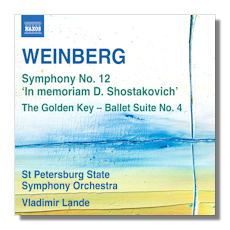
The Internet's Premier Classical Music Source
Related Links
- Weinberg Reviews
- Latest Reviews
- More Reviews
-
By Composer
-
Collections
DVD & Blu-ray
Books
Concert Reviews
Articles/Interviews
Software
Audio
Search Amazon
Recommended Links
Site News
 CD Review
CD Review
Mieczysław Weinberg

- Symphony #12 "In Memoriam D. Shostakovich" (1976)
- Ballet Suite #4 "The Golden Key" (1954-55)
St. Petersburg State Symphony Orchestra/Vladimir Lande
Naxos 8.573085 75:40
As the reader can see from the heading, Weinberg's 12th Symphony is dedicated to the memory of Dmitri Shostakovich. Weinberg was a close friend of Shostakovich and was clearly influenced by him in his music, as I noted in my review of the Weinberg 6th Symphony (Naxos 8.572779) back in 2012. In Weinberg's 12th Symphony the shadow of Shostakovich seems to loom even larger than in the earlier work. In every movement you hear music that might well have been written by Shostakovich. True, the orchestration is less varied than Shostakovich's, and there is less color and a bit more dissonance. In addition, Weinberg generally uses brass instruments considerably differently: Shostakovich's brass was more consonant, less disruptive, whereas Weinberg's brass could be rowdy and even savage. In the end, you notice that Weinberg was a little more modern and stark in sound, less conventional in form, and perhaps marginally more progressive. That said, his gloomy moods, often dominated by probing, mysterious strings (try the opening of the third movement), had the fingerprints of Shostakovich all over them.
But what is odd about Weinberg's music is that when it seems to give plentiful nods to Shostakovich, it is first class Shostakovich that we hear, not imitation Shostakovich. This 1976 work was written in the wake of Shostakovich's death, and it's almost as if Shostakovich's ghost appeared, changed his style somewhat, and then produced this powerful symphony. This nearly one hour work is cast in four movements, with the lengthy first (20:40) and last (17:13) comprising most of the symphony.
Vladimir Lande seems to grasp the heart and soul of this music. He consistently captures the seemingly ever-present tension and struggle of this music, from the tortured unison theme that opens the work to the menacing rhythmic theme appearing midway through the third movement and on to the playful marimba melody that opens the finale. Everything in the performance is well phrased and played, and thus because of a lack of competition in this music (this is currently the only recording listed in the catalog), admirers of Weinberg, and for that matter, of Shostakovich will find this a most desirable disc.
Having written all this, I must acknowledge that some readers may now be wondering if Weinberg's 12th Symphony is as good as a Shostakovich symphony? Well, when you compare Prokofiev to Shostakovich, or Sibelius to Shostakovich, or Mahler to Shostakovich, you're comparing apples to oranges. But when you compare Weinberg to Shostakovich, you're almost comparing apples to apples. So, I'll say this: Shostakovich is the stronger composer when he is in good form. But of course, he wrote his share of stinkers – Symphonies 2, 3, 7, 11, and 12, not to mention a slew of mediocre film scores. This Weinberg symphony is better than those five symphonies and many other Shostakovich works, though it doesn't rise to the artistic heights of the Shostakovich 8th, 10th, 13th, or 14th Symphonies. I'd like to hear more Weinberg to assess his ultimate worth, and so I will closely follow this Naxos series.
The 18 minute ballet suite #4 from The Golden Key is the filler here, and it's no mere throw-in. The music is mostly light, and once again the voice of Shostakovich is present, but somewhat less so. Still, those familiar with the older composer's ballet suites will have an idea of what to expect. The music is upbeat – even Elegy (#2) isn't heavy-going – and the eight selections are mostly quite brief. There's a lot of humor here too – try Dance of the Cricket (#4) and Dance of Shushera the Rat (#6). So, if you need an antidote to the serious outpourings of the symphony, you get it in spades on this well-filled disc. The Naxos sound reproduction is clear and powerful. Recommended.
Copyright © 2014, Robert Cummings





















